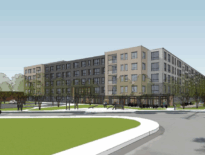
A group of elected officials from Somerville and Cambridge speak to lawmakers at a hearing in Gardner Auditorium on Sept. 9, 2025. From left: Rep. Christine Barber, Rep. Mike Connolly, Mayor Katjana Ballantyne, Sen. Pat Jehlen. Photo by Ella Adams | State House News Service
The battle for a local-option real estate transfer tax has risen from the dead as communities across Massachusetts are once again returning to Beacon Hill and urging the Legislature to give them one more tool to help attack the intensifying affordable housing crisis.
Lawmakers, school superintendents, law enforcement officials, real estate professionals and health care workers from Martha’s Vineyard, to Somerville, to Concord renewed their support Tuesday for a policy the Legislature swept aside last session that would let localities place a fee on high-cost real estate transfers.
Gov. Maura Healey proposed the policy in a housing bill she filed last session, though the House and Senate did not include it in the sweeping version of the legislation that became law.
The policy was blasted by the Massachusetts Board of Realtors and the Greater Boston Real Estate Board, which have said it would negatively impact the real estate market and would be an inefficient tool to raise revenue for housing.
Others in the industry, like 30-year Martha’s Vineyard real estate professional Candace LaRosa, told lawmakers that the position of those entities “does not represent the positions of the realtors, brokers and agents I work with on our island.”
“While they worry about what will happen if there is a transfer fee, many of us are frightened about what our communities will do without it,” LaRosa said, recalling that she testified in favor of the concept in 2004. “We can’t wait another 20 years and continue these trips to the Capitol to testify and plead with you. Please give us this tool.”
What Latest Bill Would Do
A Sen. Jo Comerford and Reps. Mike Connolly and Carmine Gentile bill (S.1937 / H.3056) would give all Massachusetts cities and towns the option to place a fee on the transfer of “luxury real estate,” per a Senate sponsor summary. The fee revenues would be placed into a locality’s affordable housing trust fund.
Communities would be able to choose the threshold for what counts as “luxury real estate,” Comerford told the Joint Revenue Committee. The bill proposes $1 million, or a county’s median sale price for a single family home, as the threshold over which a real estate transfer fee is collected. Comerford said that figure “is the floor,” and that any community could choose to raise that threshold.
The year-to-date median single-family or condominium sale price in 55 Massachusetts towns and cities was over $1 million, plus five Boston neighborhoods according to The Warren Group, publisher of Banker & Tradesman.
It’s a hyper-local battle, as well — 19 cities and towns have filed home rule petitions on the issue, according to Connolly, who said that the proposals could collectively raise more than $200 million annually on the local level to help build affordable housing.
“The two cities I represent, Somerville and Cambridge, have done practically everything we could ask of them to address our affordable housing crisis,” Connolly said. “At the end of the day, when we say we need to build housing, it has to be more than simply making it easier to zone for housing. We know that there’s limited funding available and that a roadblock to producing new housing is the availability of capital, and in particular the availability of funding for affordable housing.”
Cape and Islands at Forefront of Push
Towns searching for new housing solutions that have filed transfer fee home rule petitions include Somerville, Concord, Martha’s Vineyard and Nantucket. Falmouth Rep. Thomas Moakley has also proposed a standalone bill (H 3193) that would establish a housing bank on Martha’s Vineyard.
Many living on the Cape and Islands said communities there face exploding housing costs, a shortage of year-round units and a recruitment and retention crisis of essential services.
A 2024 housing law expanded the designation of “seasonal communities,” which presented opportunities for cities and towns, like those on the Cape, with a large number of second home properties that contribute to housing challenges. But Sen. Julian Cyr said that while those towns have “swiftly” adopted the designation, “Without a significant revenue source, we don’t believe we can fully realize the seasonal communities designation.”
Taking advantage of the designation and addressing housing preservation and building needs is only achievable with a larger dedicated revenue stream, Martha’s Vineyard Commission Island Housing Planner Laura Silber said. State estimates show a need to add another 740 units into the island’s year-round inventory, she said, “just to meet our existing need across the six towns, as well as to protect over 2,700 naturally-occurring year-round units that are at risk of being lost to the luxury market.”
Shrinking Pool of Funds for Munis
Somerville Mayor Katjana Ballantyne said that cities and towns are facing the loss of American Rescue Plan Act and other federal funds, along with shrinking revenue for affordable housing by way of new development linkage fees.
“We know that Massachusetts has lost hundreds of millions of dollars in federal revenue,” Comerford said. “By denying municipalities the option to generate any revenue transfer of luxury real estate, we are leaving hundreds of millions of dollars of affordable housing on the table that these communities need.”
Estimates suggest Massachusetts needs to build 220,000 homes by the end of the decade to meet demand. While more than 90,000 have been completed or entered development since Healey took office, an analysis by U.S. Data Labs ranked Massachusetts as the sixth-lowest among states in per capita building permits in 2024.
The climate for transfer fee bills this session could be influenced by a possible 2026 ballot proposal authorizing cities and towns to limit permissible rent increase as a way to counteract the affordability crisis.






